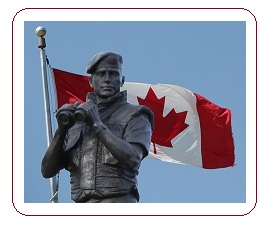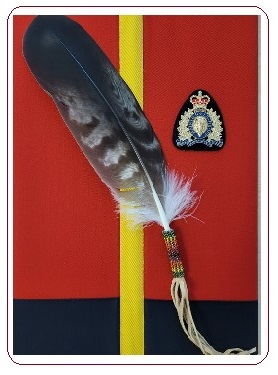True and Fascinating Canadian History
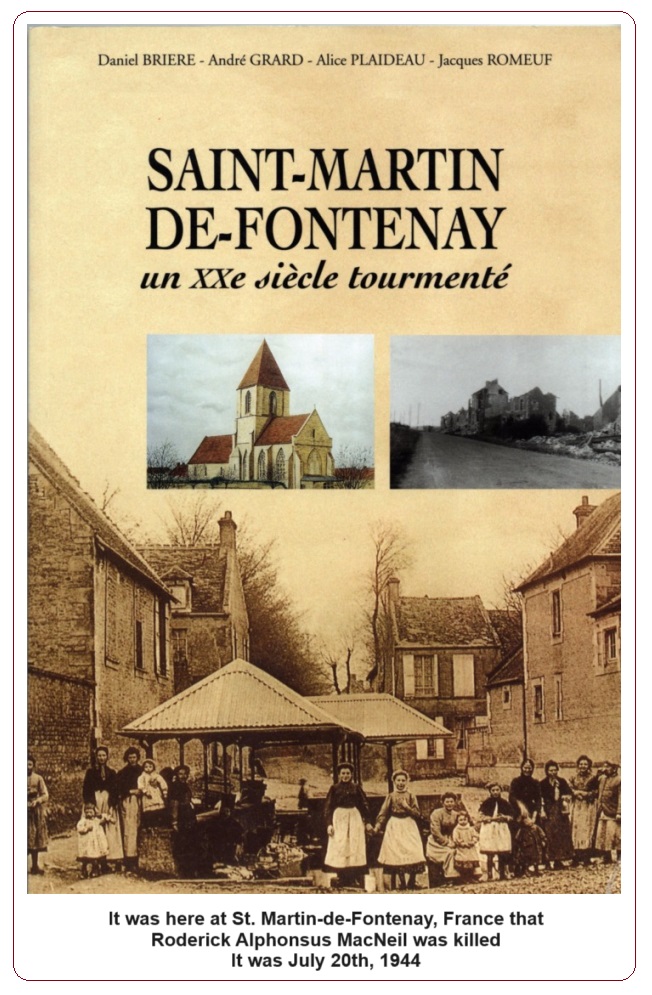
Vet of the Month: November, 2023
Reg.#14546, Constable Roderick Alphonsus MacNeil. WWII. KIA
RCMP Vets. Ottawa, ON
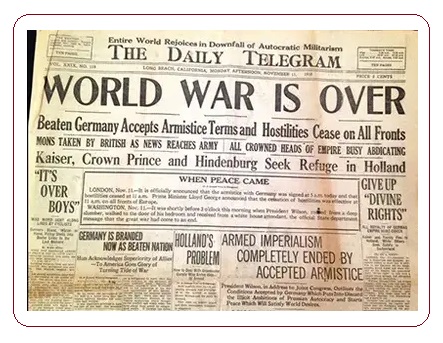
A vast number of historians, scholars, politicians, military leaders, and other people believed that World War I would be the "war to end all wars." The sentiment to end all war was based primarily on the cost, the reality and ravages of war -- the untold thousands and thousands of people who had been killed during WWI as well as the widespread destruction the war had caused. On the one hand, at war's end, few people could ever imagine another war on a worldwide scale, but on the other hand, the times were difficult and unsettled.
After WWI, Germany more than any other country expressed loudly its unsettled mood. In the air, there lingered an after taste of more war in due course. One day in the future, Canada would again be drawn into WWII, and thousands of Canadians would be asked to sacrifice their life.
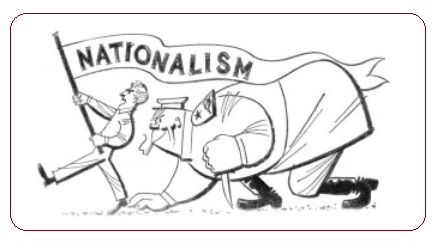
The Armistice to end WWI was agreed upon on November 11, 1918 yet only an uneasy peace existed, and there were no definite assurances that peace could last. The Treaty of Versailles in 1919 left Germany in a disgruntled mood, and their despair was only exacerbated by bitterness, aggression and a widespread sense of nationalism. In his 2015 journal article titled, After the Great War: Nationalism, Degenerationism and Mass Psychology in the Journal of Social and Political Psychology, author Juan García-García defined Germany's nationalism as, "... A doctrine that encouraged ambition and collective aggression against other nations with no limit or moral restriction whatsoever." One could argue that the countries which felt some sense of victory after WWI might at the same time also be blamed for ignoring the warning signs outwardly expressed by Germany. On the Treaty of Versailles website, History.com editors wrote, "...The Treaty of Versailles humiliated Germany while failing to resolve the underlying issues that had led to war in the first place. Economic distress and seething resentment of the treaty within Germany helped fuel the rise of Adolf Hitler and his Nazi Party, as well as World War II." During the ensuing years after WWI, nationalism was fostered within Germany as a legitimate tool to promote change, yet what transpired wholly lacked any moral footing or any moral justification. Germany triggered World War II, and Canada was immediately swept into action, and even though Canada was unprepared for war.
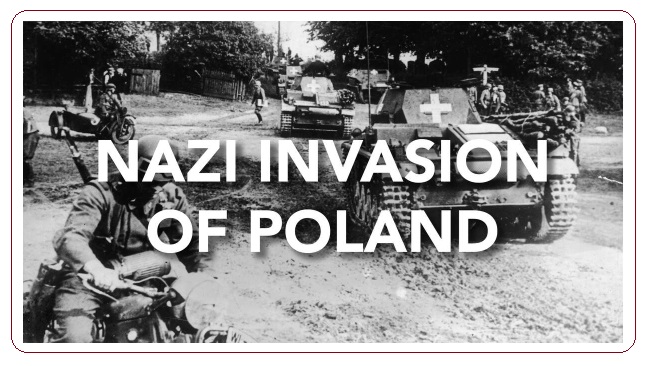
At dawn on September 1st, 1939, Germany invaded Poland. Canada entered World War II on September 10th, 1939 only seven days after Britain and France. World War II was one of the most significant events in Canadian history. An overview of Canada and WWII was provided by The Canadian Encyclopedia, it said, "Canada played a vital role in the Battle of the Atlantic, and contributed forces to the campaigns of western Europe beyond what might be expected of a small nation of then only 11 million people. Between 1939 and 1945 more than one million Canadian men and women served full-time in the armed services." From the very outset, members of The Royal Canadian Mounted Police (RCMP) volunteered for WWII. A very small selection of RCMP members who lost their life in WWII will now be highlighted.
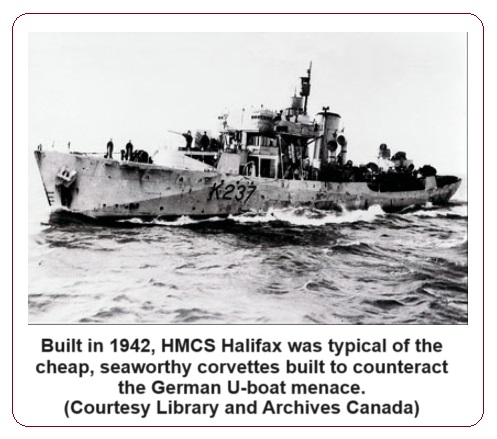
In the summer of 1939, Reg.#12438, Marine Engineer Aurele Phillippe Joseph Allard was killed when his ship was sunk by an enemy submarine. His body was lost at sea. On March 19th, 1940, Reg.#5588, Claud Edward Alban Williams was killed in Belgium. He was 48 years of age. Reg.#12795, William Archibald Willison joined the Royal Norfolk Regiment as a Second Lieutenant in 1937. He landed at Dunkirk where he was killed at 22 years of age. Back home, Willison's wife also died after hearing the news of her husband's death at Dunkirk. Reg.#12558, Arthur Francis Le Maistre joined the Royal Air Force (RAF). He was shot down during the Battle of Narvik over Norway on April 9th, 1940. Reg.#12589, Constable John Bryson also joined the RAF. He too was shot down over England. He died at 27 years of age. Reg.#10063, Constable Charles James Johnstone died as a result of an enemy boat attack while on the troopship 'Nerissa.' His body was lost at sea. Hundreds of other members of the RCMP exhibited bravery and lost their life throughout the entire course of WWII.
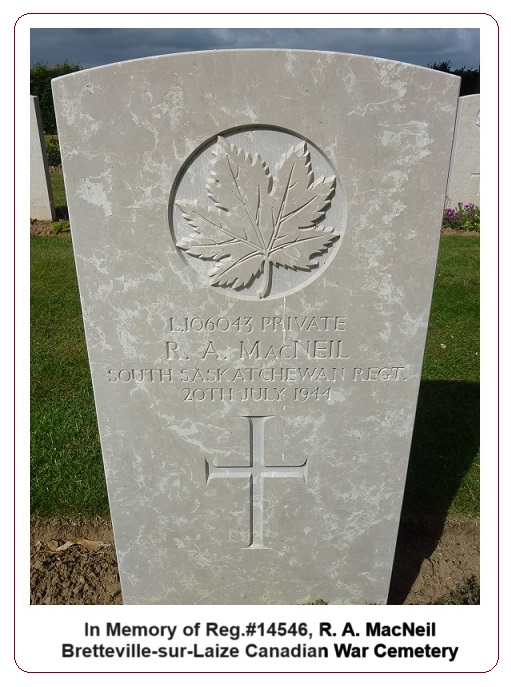
This short tribute is dedicated to Reg.#14546, Constable Roderick 'Roddy' Alphonsus MacNeil. He was born in Glace Bay, Cape Briton, Nova Scotia in early 1921. He joined the RCMP in January, 1943, but after a short stint of only 4 months police service, MacNeil responded to the call for volunteers. He left the RCMP and he joined the South Saskatchewan Regiment in Regina on May 7th, 1943. According to Wikipedia, the South Saskatchewan Regiment was an infantry regiment of the Canadian Forces. The Regiment held an honourable war record. Wikipedia said, "During the Second World War, The South Saskatchewan Regiment participated in many major Canadian battles and operations, as part of the 2nd Canadian Infantry Division. The South Saskatchewan Regiment fought in the Dieppe Raid of 1942, Operation Atlantic, Operation Spring, Operation Totalize, Operation Tractable, and the recapture of Dieppe in 1944."
After enlisting with the South Saskatchewan Regiment, Roddy MacNeil was shipped overseas. He was embedded with Operation Atlantic and the 2nd Canadian Infantry Division as they moved through France. MacNeil's precise military activities overseas are unclear, but according to the website titled, "Day Overload," it is known that the allies reached Saint-Martin-de-Fontenay on July 20th, 1944, and on the same day, Roddy MacNeil was killed during Operation Atlantic at St. Martin-de-Fontenay. He was 23 years of age.
A soldier's mind must be rattled at the thought of going to war and of possible death. But, every Canadian who volunteered for WWII displayed an unusual high degree of courage, duty and honour. Those qualities defined Roddy Alphonsus MacNeil. He fell into the special category of heroism, and he offered his life for Canada.
Roderick 'Roddy' Alphonsus MacNeil was buried in the Bretteville-sur-Laize Canadian War Cemetery in Calvados, France.
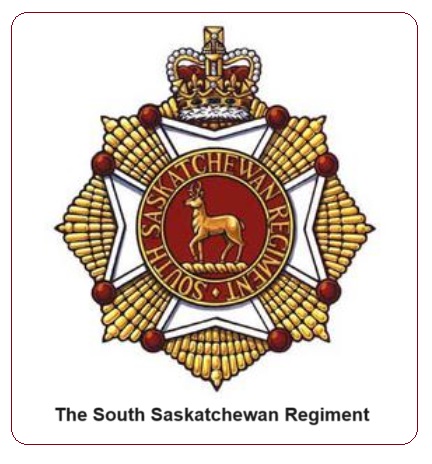
Canadian Encyclopedia.
https://www.thecanadianencyclopedia.ca/en
Day Overload. Saint-Martin-de-Fontenay (Calvados). The cities of Normandy during the 1944 battles.
https://www.dday-overlord.com/en/battle-of-normandy/cities/saint-martin-de-fontenay
García-García, Juan. (2015). After the Great War: Nationalism, Degenerationism and Mass Psychology. Journal of Social and Political Psychology. 2015. Vol. 3(1). pps. 103–123. https://doi.org/10.5964/jspp.v3i1.371.
The Tready of Versailles.
https://www.history.com/topics/world-war-i/treaty-of-versailles-1.
Wikepedia. The South Saskatchewan Regiment.
Reporting from Fort Healy,
J. J. Healy
November 23, 2023


